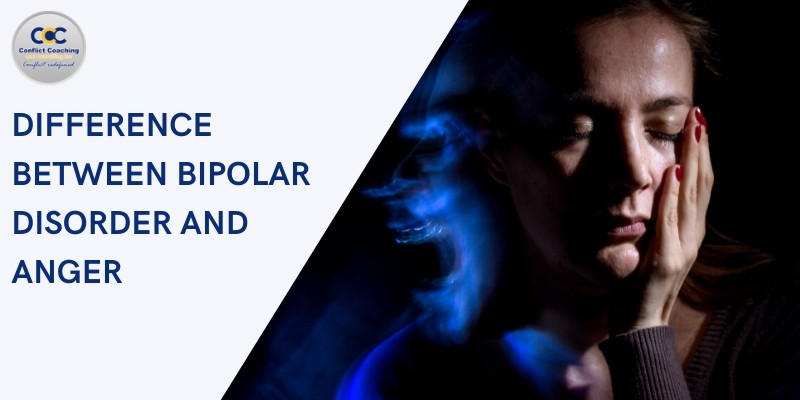
The Difference Between Bipolar Disorder and Anger? Here It’s Explained
Anger and crankiness are common bipolar disorder symptoms. While anger is a natural emotion that many people experience at times in their lives, a bipolar disorder person is more prone to impulsive and unreasonable temper tantrums.
Individuals with bipolar disorder can experience anger when they’re depressive or manic. The anger they feel during the hyper-manic period may be directed at some other individual, whereas, during a period of depression, they can become mad at themselves. These severe mood swings can be highly distressing, leaving a person with the impression that they have lost control over their emotions.
Uncontrolled anger can significantly impact a person’s friendships, family, and career. This article will discuss the differences between bipolar disorder and anger, how individuals can recognize and manage their triggers, and the core symptoms to defuse to prevent future incidents.
The Difference between Bipolar Disorder and Anger?
Even though bipolar disorder and anger seem like the same issue, the etiology, symptoms, and treatment approaches are really different. So let’s explore both conditions in detail to understand the difference between anger and bipolar disorder.
Bipolar Disorder
Bipolar disorder is a mental disorder that is characterized by unusual mood changes, activity patterns, energy, concentration, and the ability to carry out daily tasks.
You may feel hopeless or sad when you are depressed, and you may get bored and lose interest in almost every activity. Conversely, when your mood changes to mania, you may feel joyous, energized, or unusually excited. Sleep, energy, behavior, and the ability to concentrate can get affected by mood swings.
Mood swings can occur infrequently or repeatedly throughout the year. While most individuals will experience depression and distress between episodes, some will not.
Even though bipolar disorder is a chronic illness, you can handle your mood swings and other symptoms by adhering to a treatment plan. Bipolar disorder is typically treated with medications as well as psychological counseling.
Anger
Anger is common in relationships, workplaces, and everyday life. It denotes a constant proneness for general hostility. But, most of the time, it arises from unaddressed scars or hurt that people have been unable to overcome, often because of past emotional or physical traumas such as neglect, emotional abuse, and sexual abuse.
It could also result from threats or failures in relationships, income, career, or health. While a few individuals are aware of their condition, others may confuse it with hatred stress, or anxiety. These people may have downplayed or minimized the importance of their prior experiences, often due to guilt and shame.
The Difference in Symptoms between Bipolar Disorder and Anger
You can identify a health condition by specific symptoms, so let’s find the differences in anger and bipolar disorder symptoms.
Symptoms of Bipolar Disorder
A person with bipolar disorder must experience periodic depression and manic episodes. An individual with bipolar disorder must experience at least three of the symptoms listed below for more than a month:
- Abnormally happy, jumpy, or wired
- Overthinking
- Lack of concentration
- Euphoria
- Poor decision-making
- Depressed moods, such as hopelessness, emptiness, or sadness
- Significant loss of interest in all activities
- Excessive weight loss without dieting, weight gain, or change in appetite
- Insomnia or excessive sleeping
- Either agitation or slowed behavior
- Fatigue or energy deficiency
- Worthlessness or excessive guilt
- Suicidal thoughts
Symptoms of Anger
While sometimes anger is acceptable and healthy, developing an anger problem can be dangerous. Take note of how to react to anger and seek professional help if necessary. Following are some of the symptoms of anger:
- High blood pressure
- Racing heart
- Muscle stiffness
- Tingling sensation
- Anxiety
- Feeling pressured
- Distress
- Guilt
- Stress
Comparison of Causes Between Bipolar Disorder and Anger
The cause or etiology of anger and bipolar is different, ultimately affecting the treatment strategy. Anger can be managed, while bipolar disorder needs to be treated.
Causes of Bipolar Disorder
Bipolar disorder’s exact cause is unknown. However, experts believe that various variables combine to make an individual more likely to acquire it.
Chemical Imbalance
Bipolar disorder is commonly thought to be caused by the brain’s chemical imbalances. Neurotransmitters are chemicals that control the brain’s functions and include serotonin, noradrenaline, and dopamine.
There is some evidence that if the levels of one or more neurotransmitters are out of balance, a person may develop bipolar disorder symptoms.
Traumas
Bipolar disorder symptoms can also be caused by any past trauma, such as:
- A relationship breakdown.
- Physical, sexual, or emotional abuse
- The death of a dear one
These life-changing events can lead to depression at any point in a person’s life.
Genetic
Bipolar disorder is also considered genetic, as it appears to run in families. In addition, family members of bipolar disorder patients are more prone to develop it themselves.
However, bipolar disorder is not caused by a single gene. Instead, various genetic and environmental factors are thought to act as triggers.
Causes of Anger
Various factors can trigger anger, including family issues, stress, and financial problems, and there can be different types of anger such as explosive, chronic, and overwhelming anger.
Anger can be triggered by an underlying problem, such as alcohol addiction or depression. Anger is not considered a disorder, but it is a symptom of many mental health disorders.
A few possible causes of anger are as follows.
Depression
Anger can be a sign of depression, which is defined as persistent sadness and lack of interest that lasts at least two weeks. Anger can be expressed openly. However, the severity of the anger and how it is expressed differs for each person.
OCD
OCD is an anxiety disorder characterized by intrusive thoughts and compulsive behavior. A person suffering from OCD has negative thoughts, impulses, or images that cause them to act repeatedly.
Anger can result from distress with your inability to control irrational thoughts and compulsive behaviors or because someone or something interferes with your ability to perform.
Alcoholism
According to studies, excessive intake of alcohol increases aggression and anger. Alcoholism, also known as alcohol abuse, is defined as consuming excessive amounts of alcohol at once or regularly.
Alcohol affects your capacity to think rationally and clearly. In addition, it accelerates impulsive behavior and can make controlling your anger more difficult.
Bipolar Disorder
Bipolar disorder can cause intense mood swings that range from depression to mania, though depression does not affect everyone with bipolar disorder. In addition, many individuals with bipolar disorder have rage, irritability, and anger episodes.
How to Diagnose Bipolar Disorder?
Your analysis may include the following to check if you have bipolar disorder:
Physical Examination
Your doctor may perform a physical exam and lab tests to find any medical problem that might cause your symptoms.
Monitoring Mood Changes
A healthcare provider may ask you to maintain a record of your mood daily, sleep cycles, or other variables that may aid in diagnosis and treatment selection.
Psychiatric Examination
You might be referred to a psychiatrist by your doctor, who will talk about your thoughts, emotions, and behavior with you. You can also complete a psychological self-evaluation or questionnaire. In addition, family and friends may be requested to provide details about your symptoms with your permission.
How to Diagnose Anger?
Anger is a natural human reaction that can be helpful and useful in certain situations, such as responding to dangers or injury to yourself or others. However, being unable to control your anger can be dangerous and end up causing issues in your life, such as affecting your professional and personal relationships.
Anger can be diagnosed if you face any of the following problems for more than a week.
- Causing verbal or physical harm to others
- You are constantly irritated
- Feel like your anger is uncontrollable
- When angry, you frequently regret what you have said or done.
- Take note of how minor or insignificant things irritate you
How to Deal with Bipolar Disorder?
Bipolar disorder is a long-term illness. Treatment focuses on symptom management. Treatment may include the following, depending on your needs:
- To balance your moods, you’ll have to take medications right away.
- Bipolar disorder requires lifelong medication treatment. People who do not receive maintenance treatment are at a high risk of experiencing a recurrence of symptoms.
- Your doctor may recommend therapy that provides counseling and support while attempting to reduce your symptoms.
- You will also require substance abuse treatment if you have a drinking or drug problem. Otherwise, dealing with bipolar disorder may be pretty difficult.
If you’re acting recklessly, having suicidal thoughts, or becoming detached from reality, your physician may recommend hospitalization. Getting psychiatric care can help you stay relaxed while also maintaining your mood, whether you are experiencing a depressive or manic episode.
How to Deal with Anger?
Consider getting help from a professional if you think your anger is uncontrollable or is negatively affecting your relationships or life.
A doctor or psychiatrist can assist you in determining whether you have any mental health issue causing your anger problems and needs to be treated. Anger management can also involve some of the following techniques for relaxation:
- Behavioral treatment
- You should take medication if you have been diagnosed with anxiety, depression, or ADHD.
- Anger management classes can help you become aware of your outbursts and teach you managing skills.
- Exercises for anger management like breathing exercises, yoga, and meditation.
Conclusion
We hope this article helped you understand the differences between bipolar disorder and anger. In addition, we have discussed all major causes and symptoms that can help you diagnose any of these conditions. Of course, self-examination is an essential factor, but we highly recommend getting professional help as soon as possible if the symptoms are severe and uncontrollable.





Responses